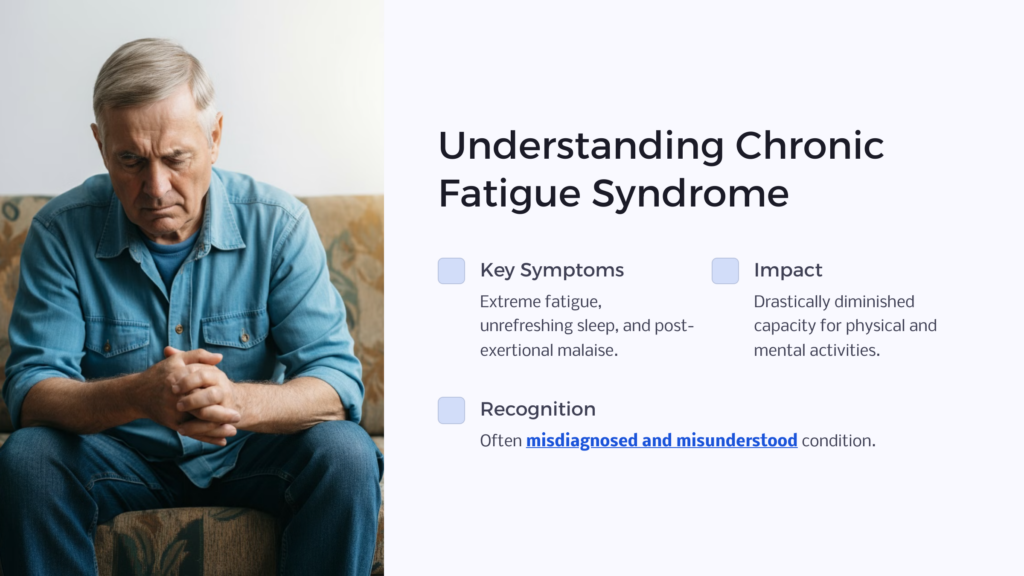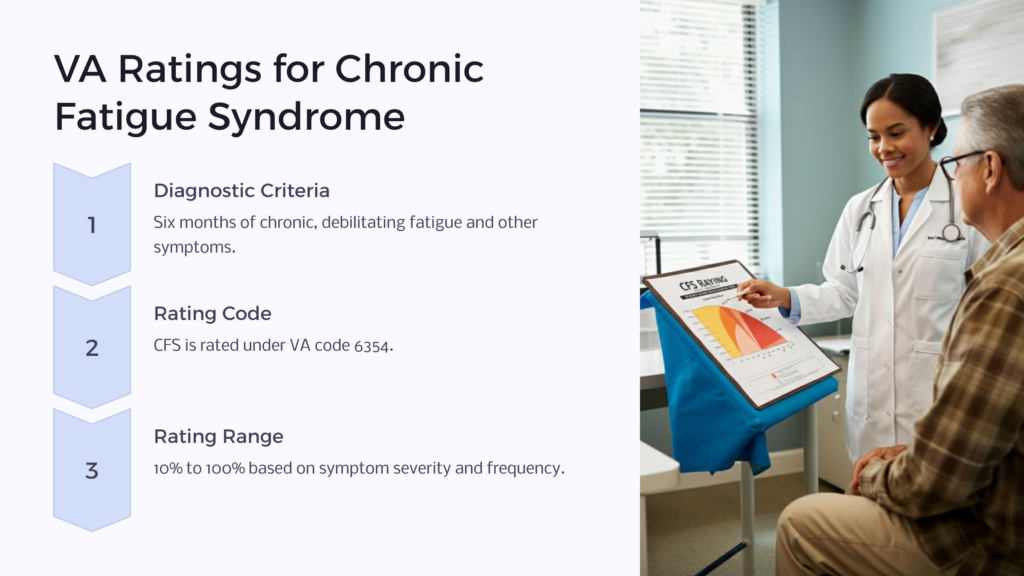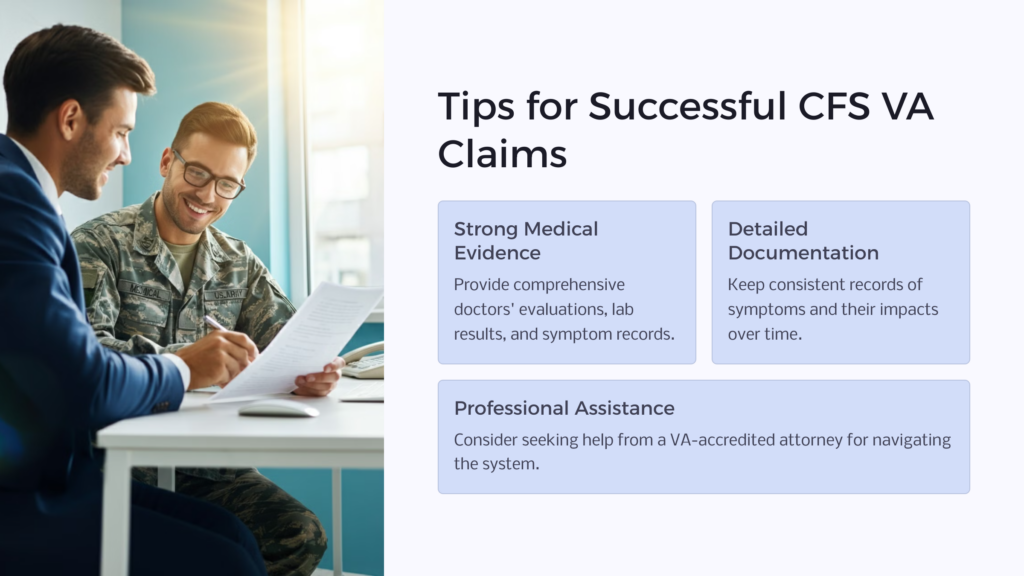
Chronic Fatigue Syndrome (CFS), also known as Myalgic Encephalomyelitis, is a complex, long-term illness characterized by extreme fatigue, unrefreshing sleep, post-exertional malaise (a sharp increase in symptoms after any form of exertion), and other symptoms. People with this condition often find their capacity for physical and mental activities drastically diminished. This article delves into the often misdiagnosed and misunderstood chronic fatigue syndrome, focusing on its impact on veterans, the importance of understanding the Veterans Affairs (VA) disability rating system, how CFS is rated by the VA, the process of filing CFS claims, tips on securing a successful claim, appeal processes, and the impacts of a successful VA claim.
Chronic Fatigue Syndrome and Veterans

The prevalence of chronic fatigue syndrome among veterans, particularly those who served or are serving on active duty during the Gulf War era, is notably higher than in the general population. Although the exact reason isn’t well-defined, it’s hypothesized that certain physical and psychological stresses experienced in military service catalyze the onset of CFS. These can include physical exertion, vaccinations, environmental toxins, sleep deprivation, and traumatic experiences. The ensuing complications severely impact veterans’ quality of life, manifesting in physical impairments, cognitive dysfunctions, restricted mobility, limited employability, and susceptibility to other chronic conditions.
Understanding VA Ratings
VA ratings, ranging from 0% to 100%, are the VA’s formal assessment of how a veteran’s service-connected conditions affect their ability to perform ordinary life and work activities. Important factors considered in VA ratings include the severity and frequency of symptoms, the impact of the condition on the veteran’s ability to work, medical prognosis, and how well the symptoms respond to treatment. The rating system is meant to grant proportional compensation for disabled veterans, ensuring they receive the care and support they deserve. A higher percentage correlates to a more debilitating disability, which then corresponds to increased VA benefits and VA disability compensation.
VA Ratings for Chronic Fatigue Syndrome

Chronic fatigue syndrome is a recognized service-connected disability by the VA, rated under code 6354. The VA employs a unique diagnostic criterion for CFS, which includes six months or more of chronic, debilitating fatigue and other symptoms like impaired short-term memory, muscle pain, and more—all unexplained by any other medical condition. Depending on the severity and frequency of a veteran’s CFS symptoms, they can receive a disability rating between 10% to 100%.
The process of Filing CFS Claims with the VA
Filing a VA disability claim for chronic fatigue syndrome involves the submission of specific documents, including a completed VA Form 21-526EZ, copies of medical evidence, doctors’ reports, and a statement detailing the illness and its effects. The process usually involves first applying for benefits online, and then undergoing a C&P examination to assess the severity and service-connection of the CFS. Yet, veterans often encounter challenges such as delayed responses, application denials, and incorrect rating decisions.
Tips for Successfully Securing a CFS VA Claim

Solid medical evidence, including doctors’ evaluations, lab results, and records of ongoing symptoms, are paramount in making a strong chronic fatigue syndrome claim. Consistent, detailed medical records that track symptoms and their impacts over time lend credibility to a claim. Understanding the VA rating system and navigating it effectively can be overwhelming; thus, seeking professional assistance, such as a VA-accredited attorney, can be beneficial.
Appeal Process for Denied CFS VA Claim
If a chronic fatigue syndrome disability claim is denied, veterans have the right to appeal. This process includes filing a Notice of Disagreement, undergoing another review, and possibly taking the claim to the Board of Veterans’ Appeals or the U.S. Court of Appeals for Veterans Claims. Veterans can increase their chances of a successful appeal with a well-prepared case, comprehensive medical records, and strong legal representation.
The Impact of a Successful CFS VA Claim
Successfully securing chronic fatigue syndrome VA disability benefits can profoundly enhance a veteran’s life. A positive VA disability rating translates into improved healthcare services, including medical treatment, mental health services, and long-term care—for both physical and psychological aspects of chronic fatigue syndrome. Furthermore, the financial compensation received can offset income losses due to reduced work capacity, helping veterans maintain a comfortable living standard.
Conclusion
Deciphering the VA’s rating system for chronic fatigue syndrome and maneuvering the claims process can be a daunting task. However, understanding these aspects is pivotal for veterans seeking recognition and compensation for their service-connected CFS. While challenges may arise, the potential benefits—healthcare access, financial stability, and ultimately a better quality of life—make the pursuit worthwhile.
 Benefits.com Advisors
Benefits.com Advisors
With expertise spanning local, state, and federal benefit programs, our team is dedicated to guiding individuals towards the perfect program tailored to their unique circumstances.
Rise to the top with Peak Benefits!
Join our Peak Benefits Newsletter for the latest news, resources, and offers on all things government benefits.



















